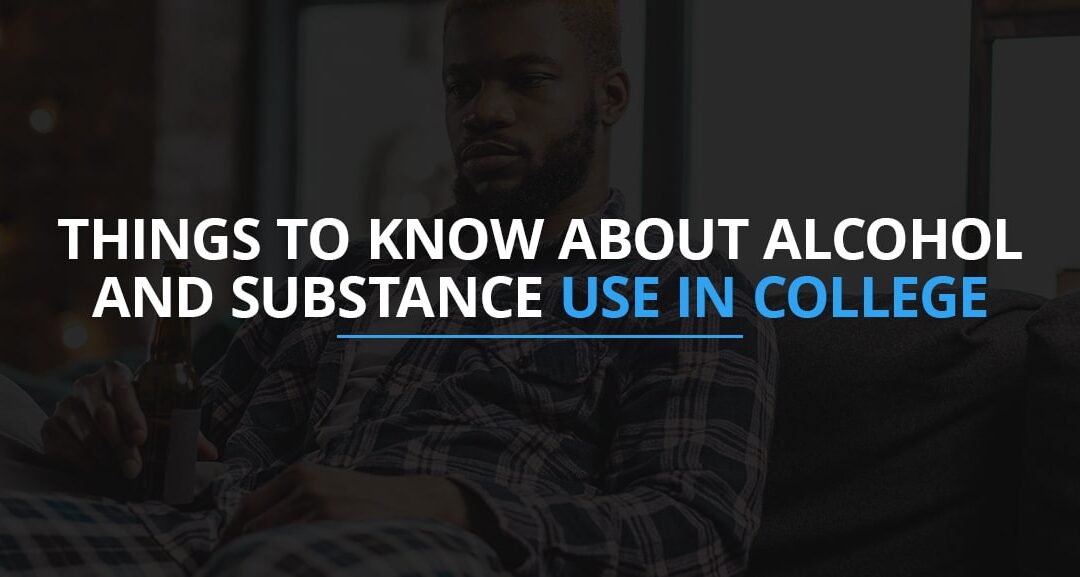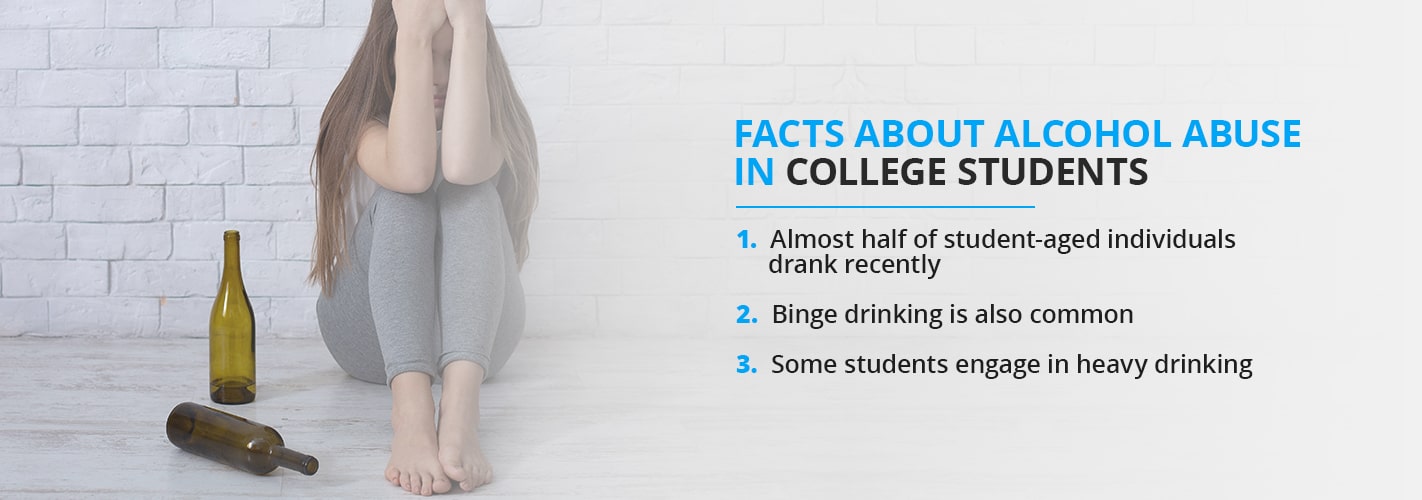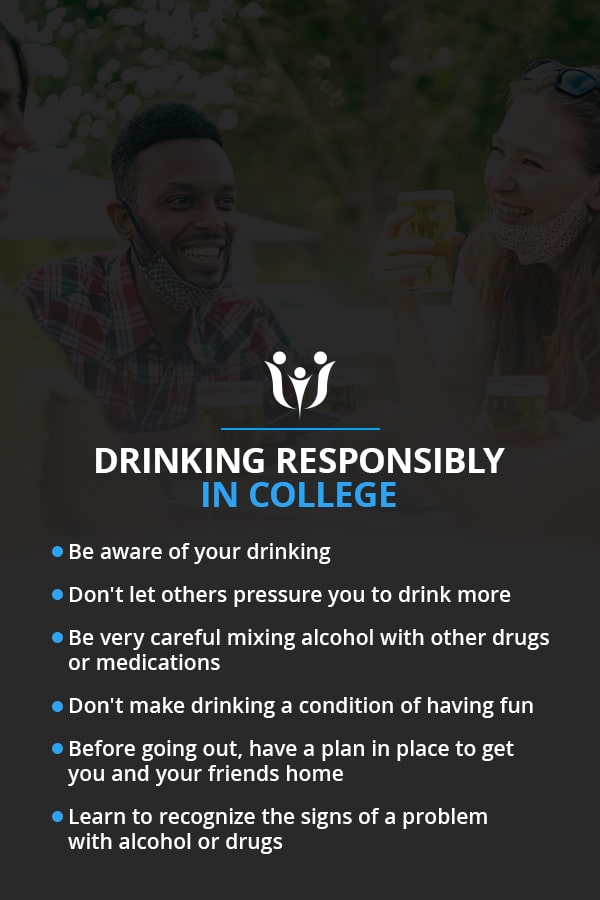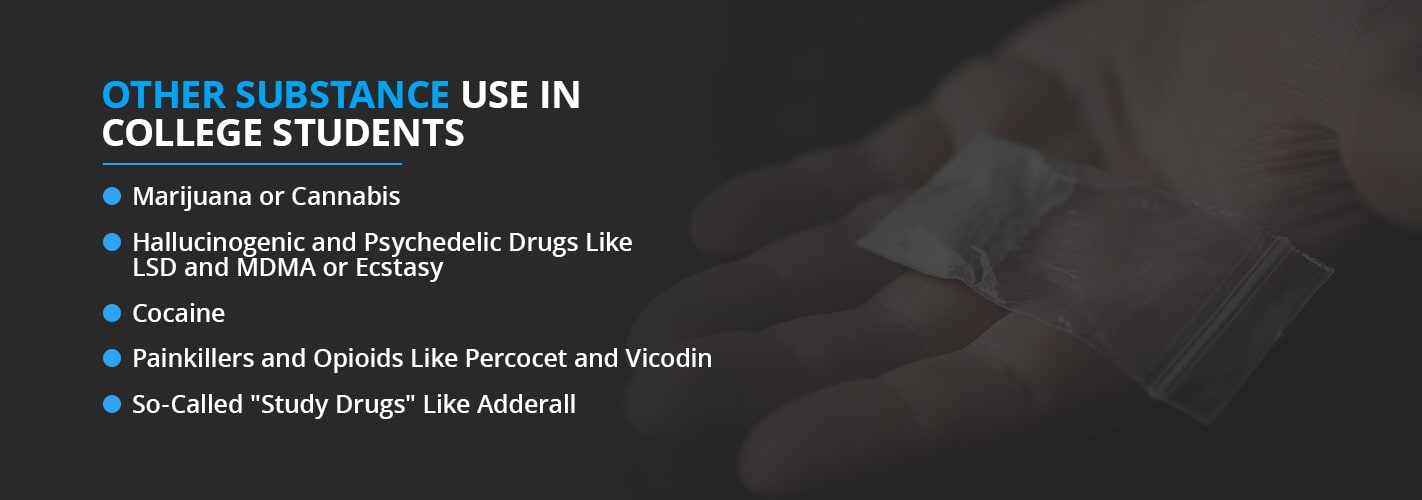If you’re concerned about college drinking culture for yourself or someone you know, you are not alone. College campuses have long been famous for football games and fraternity parties where consuming huge amounts of alcohol is seen as a badge of honor. For those who choose not to drink or want to drink responsibly, peer pressure can be enormous. Students who have developed problems with alcohol or drugs may be unsure where to turn for help. If any of those statements describe you or someone you know, this article offers assistance.
Facts About Alcohol Abuse in College Students
The following statistics reported by the National Institute of Health reveal how prevalent problematic drinking is among college-aged people:
- Almost half of student-aged individuals drank recently: In 2019, almost 50% of people ages 18-22 drank alcohol at least once in the past month. Of them, 52% were college students.
- Binge drinking is also common: Within this age group, 29.6% of people reported binge drinking in the past month, with 33% of college students reporting binge drinking in the past month. Binge drinking is roughly defined as four to five drinks in a two-hour period.
- Some students engage in heavy drinking: Regarding regular heavy alcohol use, 7% of adults ages 18-22 and 8.2% of full-time college students report heavy drinking. Heavy drinking is roughly defined as over seven to 14 drinks weekly.
These statistics reveal that drinking in general, binge drinking and heavy drinking are all more prevalent among college students than they are among people the same age who aren’t attending college. This level of alcohol consumption can lead to a range of issues, including:
- Fatalities: The most recent National Institute on Alcohol Abuse and Alcoholism (NIAAA) statistics estimate that 1,519 college students die from unintentional alcohol-related injuries each year, including motor vehicle accidents.
- Alcohol use disorder: In 2019, 8.1% of adults ages 18-22 and 8.7% of full-time college students met the criteria for AUD or alcohol use disorder.
- Physical conditions: Research has shown that alcohol misuse leads to an increased chance of developing liver disease, heart disease, stroke, stomach bleeding, brain damage, immune system disorders and various cancers. Misuse of alcohol also results in higher incidences of diabetes, high blood pressure, sleep disorders and sexually transmitted diseases.
- Accident-related injuries and death: Alcohol misuse results in a much higher number of accident-related injuries and deaths. It can lead to a greater chance of drowning, injuries from violent crimes, motor vehicle accident injuries and even an increased risk of death from homicide.
These numbers show the increased risk that alcohol misuse can lead to, but on the other hand, they also show that many college students don’t binge drink. It’s entirely possible for some people to enjoy alcohol responsibly in college. Alcoholism in college students is an issue, but many students can learn techniques to control their drinking and recognize and avoid problematic drinking.
Drinking Responsibly in College
Once you have reached the legal age to drink in your area, it’s very possible to manage alcohol use in college. While everyone is different and some people become dependent on alcohol or other substances sooner than others, the following tips can help those who want to enjoy alcohol responsibly:
- Be aware of your drinking: It can be easy to lose track of how much you’re drinking. Do you “pre-game” or drink before going out? Are you or your friends keeping your cup full from a pitcher or keg that makes it tough to know how many you’ve really had?
- Don’t let others pressure you to drink more: An ability to drink a lot is not a measure of prowess, so don’t try to match others drink for drink. At college, we often hear stories from other students or graduates about how much they drank, but we need to realize that much like fishing stories, these tales are often greatly exaggerated. Any person teasing you or trying to make you feel bad for not drinking more does not have your best interests at heart.
- Be very careful mixing alcohol with other drugs or medications: These substances can cause side effects in each other, some of which can be very severe.
- Don’t make drinking a condition of having fun: There’s nothing wrong with having a beer with friends, but try to plan activities that don’t revolve around alcohol, too. Alcohol use on college campuses can be avoided with a variety of fun and sober events.
- Before going out, have a plan in place to get you and your friends home: In fact, have a contingency plan in the event that your designated driver doesn’t manage to abstain. Remember to keep your phone charged in case you need it.
- Learn to recognize the signs of a problem with alcohol or drugs: The sooner you get help for yourself or a friend, the better. You might have an easier time overcoming an addiction if you address it sooner rather than later. And the sooner you stop binge drinking or drinking heavily, the less physical, mental and emotional damage you will likely experience.
What Leads to Substance Abuse in College?
Many people describe their college years as one of the best periods in their lives. It’s a time when lifelong friendships are forged, new ideas are explored and people take the first steps toward building a life for themselves. However, going away to college marks a drastic and abrupt change in lifestyle for many, and adapting to it can lead to stressful situations like:
- The weight of expectations from parents, teachers, other students and yourself
- More freedom and less structure than you experienced growing up
- Hectic schedules that can lead to stress
- Feelings of loss of control
- Feelings of loneliness, isolation or homesickness
- Social anxiety
- Fear or uncertainty about how decisions will affect your future
- Financial stress regarding student loans and so on
Combined, the stresses college students face, many of them for the first time, may lead them to seek temporary relief by indulging in alcohol or other substances. That can then grow into substance or alcohol addiction in college students. But there are also social and cultural reasons that lead to excessive drinking or substance use. For those who may be predisposed to substance misuse, it can be difficult to control their drinking when alcohol use permeates the entire culture on many college campuses.
Drinking Culture in College
There are many ways in which the atmosphere on college campuses and at events encourages alcohol abuse in college students:
- Peer pressure to drink excessively
- Exaggerated stories about how much others have drunk in the past
- The idea that you must drink to fit in
- The notion that excessive drinking is normal or expected in college
- The prevalence of drinking at sporting events
- The even higher expectation to drink excessively at fraternity and sorority events — binge drinking is sometimes even a requirement of membership
Having an understanding of college drinking culture can help you recognize these situations and avoid them to maintain responsible drinking.
What Is the Average Alcohol Consumption in College Students?
One study found that, on average, students had 1.7 drinks a day with 2.8 abusive drinking events monthly. The study additionally showed that the more students were exposed to environmental factors, the more heavy, frequent drinking increased.
How Much Is Too Much?
It’s entirely possible to juggle academic responsibilities with having a drink or two on a night out with friends or at a football game. But the combined stress and drinking culture of many colleges make it very easy to move from social drinking to excessive drinking, sometimes without even realizing it. It can be especially difficult to know when your drinking is becoming problematic when everyone else around you seems to be drinking as much or more. Alcohol affects people differently. Factors like body weight, the presence of other drugs or medication in the body and whether the person eats before or while drinking can have a major impact. There could be differences in how alcohol affects them or how much alcohol it takes for them to become impaired. There is also disagreement among professionals about how much alcohol is problematic. Some say three drinks or fewer a day is an acceptable number. The Centers for Disease Control and Prevention (CDC) lists drinking in moderation as two drinks or fewer a day or not drinking at all. Instead of going by the amount or frequency of drinking, a better way to gauge problematic drinking might be to look at the repercussions the drinking or substance use is having on your life physically, academically and socially.
Signs of Alcoholism in College Students
Alcoholism and AUD don’t manifest the same way in everyone. If you’re worried that drinking is becoming problematic for you or someone you know, look for any of the following signs:
- You use alcohol or drugs for a longer period than you intended.
- You sometimes want to cut back on your alcohol or drug use, but your attempts are unsuccessful.
- You spend a lot of time finding, using or recovering from alcohol or drugs.
- You have strong cravings for alcohol or drugs.
- You have used drugs or alcohol even when it’s dangerous to do so, like while driving.
- You have experienced health issues related to your alcohol or drug use.
- You have experienced withdrawal symptoms when you’ve attempted to stop or cut back on your alcohol or drug consumption.
- You drink in the morning, throughout the day, while alone or prior to going out.
- You find you need larger and larger quantities of alcohol or drugs to achieve the same effects.
Signs of alcohol abuse in college students can also be psychological:
- You feel ashamed of your alcohol or drug consumption or lie about how much you have consumed.
- You sometimes can’t remember what happened while you were under the influence of alcohol or drugs.
- You get angry when someone mentions addiction or suggests you have a problem.
You might also experience social and personal consequences of alcoholism or substance use disorders:
- You decline other activities for opportunities to use alcohol or drugs.
- You base your schedule around using or recovering from alcohol or drugs.
- Your alcohol or drug use results in you missing work, school and other obligations.
- You have abandoned social or recreational activities you used to enjoy because of your alcohol or drug use.
- Your drug or alcohol use has resulted in the end of friendships or other relationships.
If several of these symptoms apply to you, you may benefit from help to control your drinking or drug use. You don’t have to exhibit all of these behaviors to have an issue with drinking or drug use — addiction is often a progressive condition that gets worse over time. It can also be easier to overcome addiction if you take the step of seeking help earlier.
Other Substance Use in College Students
Alcohol is the drug of choice on many campuses because it is socially acceptable and easy to obtain, but it isn’t the only drug used by students. Some other drugs frequently used on campuses include:
Marijuana or Cannabis
Cannabis legalization is spreading across the country, making it much easier to obtain. It’s also now available in many other forms, with vaping being most popular among people in their 20s.
Hallucinogenic and Psychedelic Drugs Like LSD and MDMA or Ecstasy
These drugs have experienced a resurgence in popularity recently. Students try them out of curiosity, and the practice of microdosing, or taking very small amounts of the drugs on a regular basis, is also on the rise.
Cocaine
Cocaine is another drug that is regaining popularity. One study revealed that around 20% of college students had the opportunity to use cocaine in the past year.
Painkillers and Opioids Like Percocet and Vicodin
Opioid abuse is a pervasive problem in the United States, and the problem extends to college campuses. Students may bring an addiction to prescription drugs with them to campus, or it can develop during their academic careers. Students who play sports or are otherwise susceptible to injury are at great risk of opioid addiction, as this issue often begins with prescribed painkillers. Painkiller and opioid addiction is a major cause of lasting injury and death among young people, and painkiller and opioid abuse among college students is a serious issue.
So-Called “Study Drugs” Like Adderall
Many students turn to these drugs to enhance their academic performance, and they are not hard to find on most campuses. Students assume drugs like Adderall can help them stay awake and focus their attention to study or finish projects. However, Adderall abuse among college students can be quite harmful, leading to a range of physical problems and possible addiction.
If You Need Immediate Help
Today, universities are acknowledging their role in drinking culture, and many have resources available for students. If you are unable to or uncomfortable using campus resources, you have other options:
- You can call the Substance Abuse and Mental Health Services Administration National Helpline at 1-800-662-HELP (4357)
- Visit Alcoholics Anonymous
- If you are thinking of hurting yourself, call the National Suicide Prevention Lifeline at 1-800-273-8255
If someone is vomiting, experiencing seizures or is unresponsive or unconscious as a result of alcohol or drug consumption, call 911 immediately.
Where Else Can You Go for Help?
Unsurprisingly, alcohol abuse in college students is rarely an isolated issue. It often stems from other social and psychological struggles, whether they be associated with the stresses of college or problems in other areas of life. Merrimack Valley Psychological Associates can help Boston area college students. Our youthful, skilled and compassionate clinicians relate to what you’re going through, and they’ll make sure you are in a comfortable, judgment-free environment as you work toward your goals. You will be treated with respect whether you come to the office or attend a session via teleconference from your home or dorm. Anything you discuss with us is kept strictly confidential. You don’t have to face issues of addiction or life’s other struggles alone. Schedule an appointment with one of our clinicians today.
Reviewed By
Dr. David Rainen, PsyD.
I am a licensed clinical psychologist with an extensive background treating a variety of different ages, situations, emotional and mental health disorders in individuals and their families. As part of my 10 year professional and training career in psychology, I have developed and refined my skills and approaches through my work in a variety of diverse settings including: hospitals, community outpatient facilities, college counseling centers, secure and unsecure inpatient/residential treatment programs, and therapeutic day schools.






